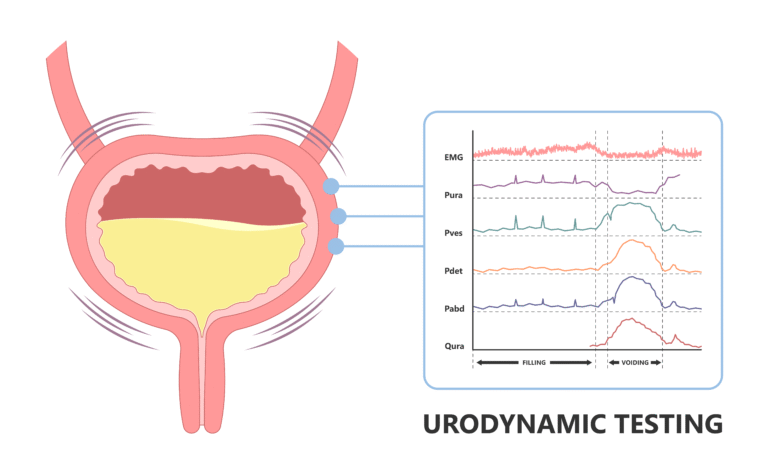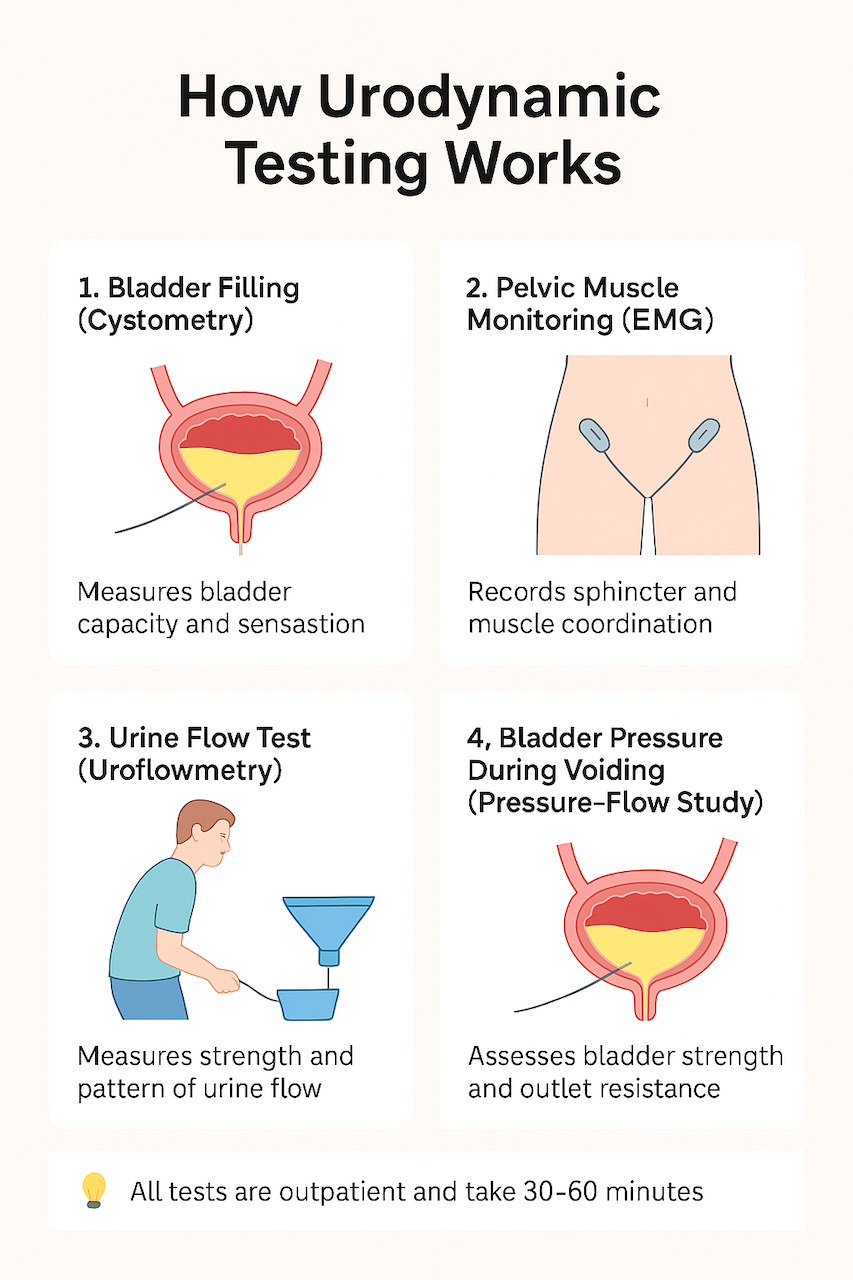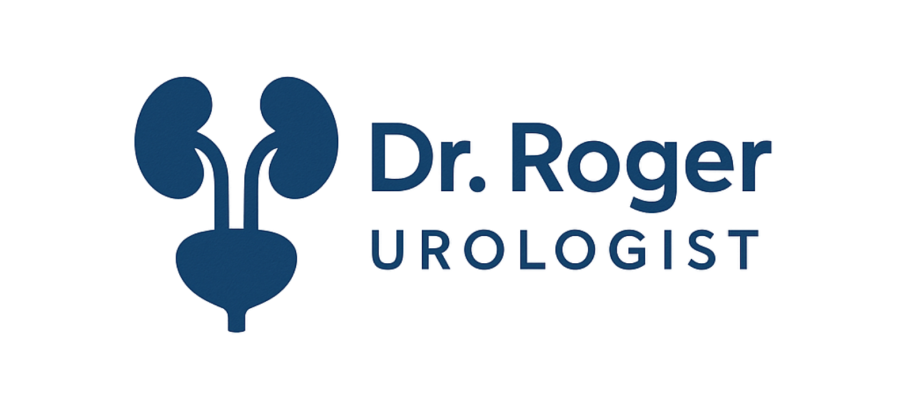What Is Urodynamic Testing?
Urodynamic testing (or urodynamics) is a group of diagnostic tests that evaluate how well the bladder, urethra, and pelvic floor muscles store and release urine. These studies provide a detailed picture of lower urinary tract function—helping identify the root causes of urinary symptoms like urgency, incontinence, or difficulty emptying.
Unlike a simple urine flow test, urodynamics offers a comprehensive assessment of bladder pressure, urinary flow rate, and muscle coordination, especially useful for patients with complex, persistent, or unexplained urinary issues.
🩺 Dr. Roger offers urodynamic testing in Kuala Lumpur starting June 2025 at Prince Court Medical Centre, combining clinical precision with a patient-centred approach to guide accurate diagnosis and treatment planning.

Who Needs Urodynamic Testing?
Urodynamic studies are typically recommended for patients experiencing urinary symptoms that are difficult to explain or have not improved with initial treatment. Dr. Roger may suggest this diagnostic test if you have:
🔹 Difficulty starting or stopping urination
🔹 Frequent urination, strong urgency, or both
🔹 Urinary incontinence (leakage or loss of control)
🔹 Incomplete bladder emptying
🔹 Recurrent urinary tract infections (UTIs)
🔹 Suspected neurogenic bladder, such as after stroke, spinal cord injury, or nerve dysfunction
🔹 Pre-surgical evaluation for incontinence or other bladder procedures
These tests are useful in both adults and children with unclear bladder symptoms or voiding difficulties. Urodynamics helps your doctor tailor a treatment plan that is safe, precise, and aligned with your condition.
What to Expect During Urodynamic Testing
Urodynamic testing is a step-by-step diagnostic study that provides a detailed view of how your bladder, urethra, and pelvic muscles are functioning. It’s typically done in a clinic setting and takes about 30–60 minutes.
Common Components of Urodynamic Testing:
Uroflowmetry
📊 Measures how fast and how much urine you pass — helpful for identifying flow obstruction.Cystometry (Bladder Pressure Test)
💧 A small catheter fills the bladder with sterile fluid to assess bladder capacity, pressure, and sensation.Pressure-Flow Study
📈 Evaluates how bladder pressure affects urine flow, useful for diagnosing bladder outlet obstruction or weak bladder muscles.EMG (Electromyography)
🔌 Measures electrical activity in the pelvic floor muscles and sphincter using surface sensors to detect coordination issues.Post-Void Residual Measurement
🧪 After you urinate, an ultrasound or small catheter checks how much urine remains in the bladder — a key step to assess incomplete emptying.
Most patients tolerate the procedure well. A local anaesthetic gel may be used to reduce discomfort, especially during catheter insertion.
Urodynamics is a low-risk, outpatient test that provides valuable insight into urinary control issues, especially when symptoms are complex or persistent.

Is Urodynamic Testing Safe?
Yes — urodynamic testing is a safe, low-risk outpatient procedure.
It is commonly performed using thin, flexible catheters and gentle techniques. While some patients may feel minor discomfort or temporary irritation during catheter insertion, serious complications are rare.
Dr. Roger and the team take special care to ensure your comfort throughout the process, using local anaesthetic gel when needed and clear step-by-step explanations to help ease any anxiety.
Why Is Urodynamic Testing Important?
Understanding your bladder’s function is key to finding the right treatment — especially if you have symptoms like frequent urination, urgency, incontinence, or trouble emptying the bladder.
By performing urodynamic studies, Dr. Roger can:
✅ Confirm or rule out conditions like overactive bladder, bladder outlet obstruction, or nerve-related dysfunction
✅ Tailor treatment plans based on your actual bladder pressure, capacity, and coordination
✅ Avoid unnecessary procedures by accurately identifying the cause of your urinary symptoms
This information helps ensure you receive the most effective and targeted care, whether it involves medications, pelvic floor therapy, or minimally invasive surgery.
Frequently Asked Questions –
Urodynamic Testing
1. Is urodynamic testing painful?
Most patients experience only mild discomfort. A local anaesthetic gel is used during catheter insertion to ease any sensation. The test is non-surgical and generally well tolerated.
2. Do I need to prepare for the test?
Yes. You may be asked to arrive with a full bladder or avoid urinating for an hour before your appointment. If you take bladder medications, Dr. Roger will advise whether to pause them temporarily.
3. Can I drive home after the test?
Yes — unless you are also scheduled to receive sedation (rare), you can resume your normal activities shortly after the test. Mild burning during urination may occur for a short time.
4. What conditions does urodynamic testing diagnose?
It helps diagnose bladder outlet obstruction, overactive bladder, underactive bladder, incontinence, and neurologic urinary dysfunction (e.g. after spinal injury or stroke).
5. How soon will I get my results?
Dr. Roger will usually review your results on the same day or at a follow-up visit. The findings will help determine your next steps in treatment.
6. Is urodynamic testing safe for older adults or those with medical conditions?
Yes. The test is suitable for both men and women of all ages and is frequently used in older adults or patients with multiple health issues. It can often prevent unnecessary medication or surgery by clarifying the diagnosis.
Concerned About Urinary Symptoms?
If you’re experiencing urinary urgency, leakage, or trouble emptying your bladder, urodynamic testing can help identify the cause and guide the right treatment.
📍 Available at Prince Court Medical Centre, Kuala Lumpur.
For appointments, please contact PCMC:
📱 WhatsApp: +6012-999 7262
📞 Call: +603 2160 0000
💻 Online appointment form here
📧 Referrals & enquiries: contact@drrogerurologist.com
🔗 Visit the Contact Page to get started




